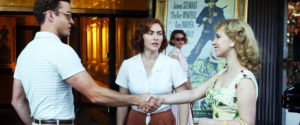Wonder Wheel
Posted on November 30, 2017 at 5:36 pm
C| Lowest Recommended Age: | Mature High Schooler |
| MPAA Rating: | Rated PG-13 for thematic content including some sexuality, language and smoking |
| Profanity: | Strong language |
| Alcohol/ Drugs: | Smoking, drinking, references to alcoholism |
| Violence/ Scariness: | Peril and off-screen violence, references to mob killings |
| Diversity Issues: | None |
| Date Released to Theaters: | December 1, 2017 |
| Date Released to DVD: | March 3, 2018 |

Mickey, who is going to school on the GI bill after his service in the navy during WWII, is having an affair with a married older woman, Ginny (Kate Winslet). She is a waitress at a clam joint on the boardwalk, but she tells him she is a former actress who is just playing the part of a waitress. Her husband, Humpty (a blustery Jim Belushi) runs the carousel. She has a young son from her first marriage who lies, steals, and sets fires everywhere. And Humpty has a daughter named Carolina (Juno Temple), estranged since she married a mobster five years earlier, who shows up because she is on the run. She has left her husband and shared some information with law enforcement, and now goons want to kill her.
All of this could be set up in a few brief scenes, but this is a movie where everything has to be said at least twice, just to drag it all out. Slate’s Sam Adams writes that Allen is trying to justify some of the highly-controversial choices of his personal life and attack his former partner (and mother of his current wife) in this film. It is equally possible to read it as a mea culpa, with Ginny’s confession that she destroyed her one chance at personal and professional happiness when she betrayed her first husband, belatedly realizing he was the love of her life, but just could not help herself. Is this fate? A recurring character flaw? Allen does not seem interested enough to follow through.
The production design gorgeously brings to life the look of 1950’s Coney Island, the beach, the boardwalk, and the rides. Ginny and Humpty literally live under the ferris wheel that gives the film its title, reminiscent of Alvy Singer’s family living under the roller coaster in “Annie Hall.” Cinematographer Vittorio Storaro gives a romantic glow to many of the scenes, perhaps making a link between Ginny’s red hair and the fires set by her son. The actors do their best to bring the characters to life, but with a repetitive, underwritten script and sour, dreary tone, it is as though instead of putting his characters in a story he tossed them like pennies in search of an I Ching fortune. In life, we can debate the role of destiny, fatal flaws, and choice. But a writer is in control of all three for his characters, and no amount of visual flair or acting talent can obscure the failure to make those choices meaningful.
Parents should know that this film includes sexual references and situations, adultery, strong language, drinking and alcoholism, references to domestic abuse and child abuse, smoking, and references to mob violence.
Family discussion: What symbols can you identify in this story? What does the ferris wheel mean? What about the fires?
If you like this, try: “Crimes and Misdemeanors”
